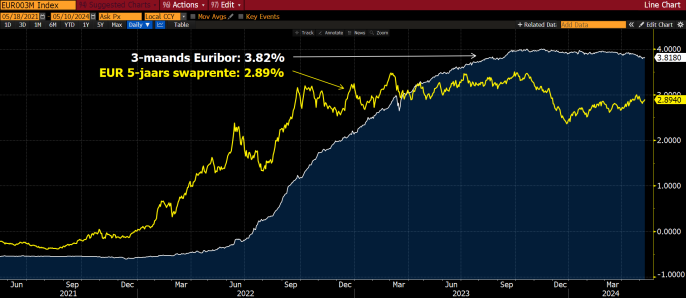Since late December, capital market rates have increased significantly, mainly due to surprisingly strong data from the US until about two weeks ago. However, money market rates have remained fairly stable and even declined somewhat in anticipation of a series of priced-in rate cuts by the ECB and the Fed. Financial markets are currently expecting rate cuts of about 1.5% to 2.0% for both the Eurozone and the US over the next three years.

Zooming in on the European interest rate markets, the difference between the 3-month Euribor (white line; 3.82%) and the 5-year swap rate (yellow line; 2.89%) has declined from about -1.6% at the end of December to about -0.9% today. In practical terms, this means that hedging your interest rate risk from short to medium-term maturities has become relatively less attractive in recent months. If you are fully or partially financed based on a variable interest rate, or are in the final stages of making a new (re)financing deal, you practically have three options:
Do nothing: financial markets as well as most banks, economists, and asset managers expect interest rates to decline significantly in the coming years. If you firmly share this opinion, hedging your interest rate risk at this point in time would be pointless.
Fix the interest rate risk: do you opt for certainty and an immediate cash flow advantage? By concluding an Interest Rate Swap (IRS), you fix the market interest rate (without a bank margin and based on 'bullet' financing) depending on its maturity between approximately 0.5% (2 years) to 1.0% (10 years) below the current 3-month Euribor.
Maximise the interest rate risk: do you opt for certainty and the possibility to benefit from rate cuts? By maximising your market interest rate, you will be protected against higher rates above a predetermined strike and, depending on the hedge, you will be able to fully (Cap) benefit from lower rates in the future or up to a predetermined level (Collar). In most cases, this can also provide you with an immediate cash flow benefit, although it is lower than with an IRS with a comparable maturity.
From a risk management perspective, we do not recommend doing nothing, but timing remains essential. We are currently seeing many companies lining up their strategy (instrument, maturity, etc.) and counterparties (ISDA, pricing, etc.) enabling them to capitalise on a market opportunity. Keep in mind that every 0.01% movement of the 3-month Euribor or sharper negotiated IRS saves about EUR 10k annually for every EUR 10 million financing...
ICC has decades of experience as independent advisor to many European companies in order to manage and hedge their interest rate risks in the best possible way: from discussing strategy, benchmarking and improving pricing at your bank(s), to live transaction support. Feel free to contact us to discuss your specific options in today's interest rate markets free of any obligation.
Do you wish to read more about managing interest rate risks? Then download our whitepaper via the link below, where we discuss the advantages and disadvantages of various hedging instruments and provide insights into (hidden) bank margins.
